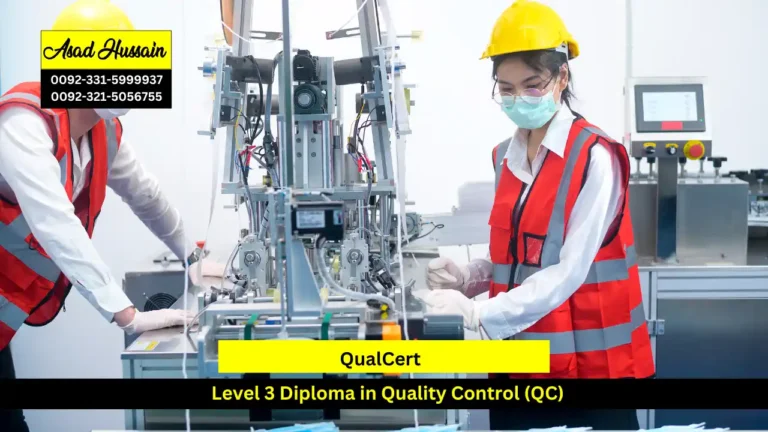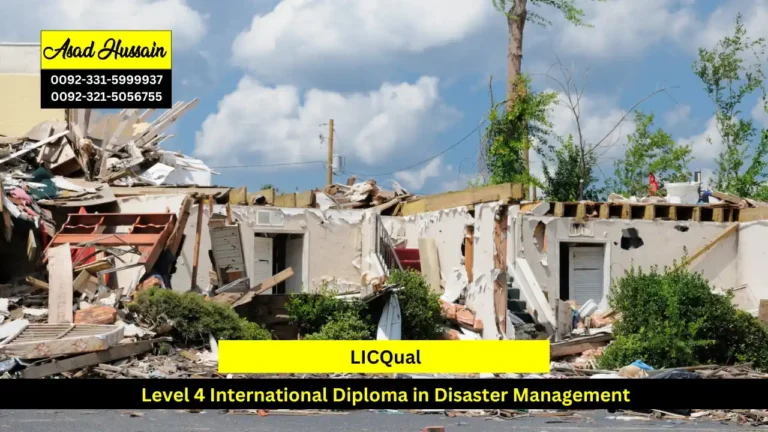The QualCert Level 4 Diploma in Quality Assurance (QA) provides an essential foundation for professionals seeking to develop practical expertise in quality management, auditing, and process improvement. In today’s competitive business environment, maintaining high standards of quality and compliance is crucial for organizational success. This course equips learners with the knowledge and skills needed to implement effective quality assurance strategies, ensuring operational excellence and customer satisfaction.
Designed to bridge foundational knowledge and advanced practice, the QualCert Level 4 Diploma in Quality Assurance (QA) focuses on quality control techniques, audit procedures, and data-driven decision-making. Learners will gain hands-on experience in conducting audits, identifying non-conformities, and implementing corrective and preventive actions, while understanding the regulatory frameworks and standards that govern quality management systems.
Participants will also develop critical analytical and problem-solving skills, enabling them to evaluate processes, optimize operations, and contribute to continuous improvement initiatives. By the end of the QualCert Level 4 Diploma in Quality Assurance (QA), learners will be capable of applying industry-standard QA practices across various sectors, demonstrating professional competence in quality monitoring, reporting, and compliance management.
QualCert Level 4 Diploma in Quality Assurance (QA) is ideal for individuals aspiring to advance in quality assurance roles, auditors seeking professional certification, and organizations aiming to strengthen their quality management teams. With a strong focus on practical application, regulatory compliance, and international best practices, the QualCert Level 4 Diploma in QA prepares learners to meet the evolving demands of modern industry and achieve excellence in quality management.
Program Highlights
Mandatory Units
- Introduction to Quality Management
- Quality Control Tools
- Quality Auditing Principles
- Documentation and Reporting in QA
- Statistical Methods in QA
- Teamwork and Collaboration in QA
To enroll in the QualCert Level 4 Diploma in Quality Assurance, candidates should meet the following requirements to ensure they are prepared for the course content and practical applications:
Age Requirements
- Minimum age of 18 years at the time of enrollment.
- Mature learners with professional experience may be considered on a case-by-case basis.
Educational Requirements
- A minimum of a Level 3 qualification or equivalent in quality management, business, or related disciplines.
- Relevant vocational or technical certifications in QA, auditing, or operational management.
Professional Experience
- Preferably 1–2 years of work experience in quality assurance, auditing, or compliance roles.
- Practical exposure to business operations, production processes, or regulatory frameworks.
English Language Proficiency
- Competency in reading, writing, and comprehension of English to engage with course materials.
- Non-native English speakers may need to provide IELTS, TOEFL, or equivalent scores.
The QualCert Level 4 Diploma in Quality Assurance (QA) equips learners with advanced knowledge, practical skills, and professional competencies required to excel in quality management and assurance roles. By the end of this program, participants will be able to apply international quality standards, implement effective audit practices, and contribute to continuous improvement initiatives within organizations.
Learning Outcomes
Introduction to Quality Management
- Demonstrate a comprehensive understanding of quality management principles and frameworks.
- Apply international standards such as ISO 9001 in organizational contexts.
- Evaluate the role of quality assurance in enhancing operational efficiency and customer satisfaction.
- Identify critical success factors for implementing quality management systems effectively.
Quality Control Tools
- Utilize key quality control tools and techniques to monitor and improve processes.
- Apply methods such as Pareto Analysis, Fishbone Diagrams, and Control Charts in practical scenarios.
- Analyze data to identify trends, defects, and areas for improvement.
- Implement process improvement strategies based on quantitative and qualitative analysis.
Quality Auditing Principles
- Plan and conduct internal audits in alignment with organizational and regulatory requirements.
- Evaluate audit findings and recommend corrective and preventive actions.
- Understand risk-based auditing approaches and compliance monitoring.
- Develop skills in assessing organizational processes against established quality standards.
Documentation and Reporting in QA
- Prepare accurate and professional quality documentation and audit reports.
- Maintain records in accordance with regulatory and organizational requirements.
- Communicate findings clearly to stakeholders and management teams.
- Ensure traceability and accountability in quality processes.
Statistical Methods in QA
- Apply statistical techniques for process control and quality assessment.
- Use sampling methods, hypothesis testing, and descriptive statistics in QA contexts.
- Interpret and present statistical data to support decision-making.
- Integrate statistical analysis into continuous improvement initiatives.
Teamwork and Collaboration in QA
- Demonstrate effective teamwork in quality assurance projects and audits.
- Facilitate collaboration across departments to implement QA initiatives.
- Resolve conflicts and communicate effectively within QA teams.
- Support a culture of continuous improvement through shared accountability.
Upon completion of the QualCert Level 4 Diploma in QA, learners will be fully prepared to implement quality assurance practices, lead audit activities, and contribute to organizational excellence while adhering to international standards and best practices.
The QualCert Level 4 Diploma in Quality Assurance (QA) is designed for individuals who aspire to enhance their expertise in quality management and auditing, gain practical skills, and contribute effectively to organizational excellence. This course caters to a diverse range of learners from different professional and academic backgrounds, providing them with the competencies needed to succeed in quality assurance roles across industries.
Educational Instructors and Trainers
- Educators seeking to update or expand their knowledge of quality assurance principles and auditing techniques.
- Trainers looking to incorporate QA best practices into curriculum or professional development programs.
- Professionals aiming to deliver workshops or training sessions on quality standards and compliance.
- Instructors requiring up-to-date skills for teaching process improvement and organizational quality frameworks.
Environmental Advocates and Activists
- Individuals interested in promoting sustainable and environmentally responsible practices within organizations.
- Professionals aiming to integrate quality assurance systems that comply with environmental regulations.
- Activists seeking to understand how QA impacts operational efficiency and environmental performance.
- Those working on projects that combine quality management and environmental sustainability.
Research and Development Teams
- R&D professionals needing to implement QA standards in product testing and development.
- Teams focused on innovation while ensuring compliance with regulatory and quality frameworks.
- Researchers aiming to standardize experimental processes and results through quality assurance practices.
- Specialists monitoring product reliability, safety, and performance in alignment with QA standards.
Corporate Social Responsibility (CSR) Professionals
- CSR managers ensuring organizational operations adhere to quality and ethical standards.
- Professionals designing and monitoring CSR initiatives with measurable outcomes.
- Team members integrating quality practices into corporate policies and social responsibility projects.
- Those responsible for reporting, documentation, and compliance within CSR frameworks.
Students and Recent Graduates
- Graduates seeking a recognized qualification to enter the field of quality assurance or auditing.
- Students aiming to develop practical skills applicable to QA roles across various industries.
- Individuals looking to strengthen employability with internationally recognized certification.
- Learners intending to build a foundation for advanced QA or management studies.
Career Changers
- Professionals transitioning from other fields to quality assurance or auditing roles.
- Individuals seeking practical skills to meet industry requirements in QA and compliance.
- Those wanting to upskill to gain credibility and expertise in quality management.
- Candidates exploring new opportunities in operational excellence, auditing, or process improvement.
Policy Makers and Regulators
- Government and regulatory officials responsible for enforcing quality standards.
- Policy designers ensuring organizations comply with QA, safety, and compliance regulations.
- Professionals monitoring audit outcomes and implementing regulatory improvements.
- Officials aiming to bridge regulatory standards with industry best practices in QA.
The QualCert Level 4 Diploma in Quality Assurance (QA) prepares learners from these varied backgrounds to implement effective quality management practices, lead audit activities, and contribute meaningfully to organizational excellence. By completing this program, learners gain both the theoretical knowledge and practical skills necessary to thrive in professional QA roles across industries.







